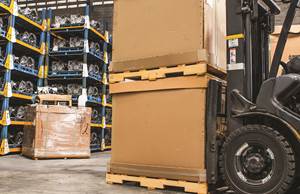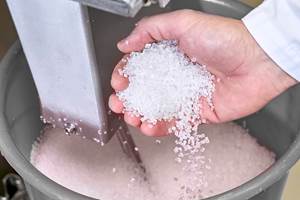DOMO, Covestro and Circularise Partner on Full Plastics Traceability
Innovative start-up Circularise says transparency can be achieved through a blockchain technology.
The Netherlands’s nylon producer DOMO Chemicals (U.S. office in Buford, Ga.); Covestro, Pittsburgh; and The Netherlands’ Circularise, an innovative transparency start-up, have announced a new collaborative project for circularity in the plastics industry through the use of blockchain technology. The newly formed Circularise PLASTICS project group aims to set up an open standard for sustainability and transparency within this field. At K 2019, Both DOMO and Covestro plan to discuss the project with customers and to look for new partners to join them on this pathway towards full circularity.
Says DOMO CEO Alex Segers, “Registries and tracking systems are key to assessing progress towards global circularity goals. Blockchain can bring transparency where it's most needed, especially when it comes to supply chain traceability in our industry. Achieving a single standard for traceability to origin would enable the industry to respond and communicate regarding sustainability practices and attach proof of origin to materials.”
The partners believe that achieving traceability and transparency in the plastics supply chain enabled by blockchain will make it more authentic and transparent. There are three main objectives:
- Choose Circular: Make it easier for suppliers, processors, manufacturers, molders and brand owners to choose traceable, sustainable and circular materials.
- Produce Circular: Create incentives for suppliers and manufacturers to produce traceable, sustainable and circular materials and products.
- Make Circular: Provide critical information for reversed logistics and take back of products, materials and components.
The compatibility of blockchains has been a hot topic, including in the plastics space, where the benefits of this new technology can serve all parts of the supply chain. “For material suppliers & processors, as well as equipment and moldmakers, Circularise plastics participation means increased material value and trust in your production, by adding material passports to plastic resin, additives, colorants and any other materials produced. For OEMs & brand owners, it helps on the road to achieving sustainability targets and a strengthened brand position, by revealing a product’s origin and transparency on its environmental impact,” says Burkhard Zimmermann, head of strategy, sustainability and digital at Covestros Polycarbonates segment.
The value of blockchain is that it avoids the use of a powerful central authority and thereby gives equal rights to all participants. Tech innovator Circularise is making transparency and communication in global value chains possible by utilizing blockchain and zero-knowledge proof. Their protocol enables trusted data exchange in fragmented supply chains without public disclosure of datasets or supply chain partners. Unlike other blockchain transparency solutions, Circularise’s technology called “smart questioning” protects a company’s privacy and sensitive information.
This means that confidentiality and competitive advantage are always maintained. The technology also eliminates the need to trust a centralized party. “Because all of the verification is done by the system itself, the idea is that users do not need to rely on a central point of control. Instead, trust is transferred from one centralized authority (such as a verifying party) to many decentralized, anonymous participants,” says Mesbah Sabur at Circularise.
The Circularise PLASTICS concept involves a seven-step process whereby the source material can be followed through a blockchain pathway, ensuring end-to-end product traceability and provenance. If ultimately accepted by the original information holder (plastic producer/molder), the OEM can access important information and make statements accordingly. This solution has two basic main advantages over other initiatives. The open protocol will enable an industry standard (on any blockchain) and avoid monopoly. The Smart Questioning technology safeguards privacy, while still allowing for transparency.
The Circularise PLASTICS project is still at a very early stage and the objective at K 2019 is to raise interest among value chain partners, that are willing to join the consortium in the ideation and testing phase. New members will become sustainability innovators in the plastics industry. This will give them access to the latest information and resources, and present the opportunity to co-create an industry-wide communication standard for a circular economy.
Related Content
Tracing the History of Polymeric Materials, Part 26: High-Performance Thermoplastics
The majority of the polymers that today we rely on for outstanding performance — such as polysulfone, polyethersulfone, polyphenylsulfone and PPS — were introduced in the period between 1965 and 1985. Here’s how they entered your toolbox of engineering of materials.
Read MoreSoft Prices for Volume Resins
While PP and PE prices may be bottoming out, a downward trajectory was likely for all other volume resins, including engineering types.
Read MoreThe Fantasy and Reality of Raw Material Shelf Life: Part 1
Is a two-year-old hygroscopic resin kept in its original packaging still useful? Let’s try to answer that question and clear up some misconceptions.
Read MorePrices Bottom Out for Volume Resins?
Flat-to-down trajectory underway for fourth quarter for commodity resins.
Read MoreRead Next
People 4.0 – How to Get Buy-In from Your Staff for Industry 4.0 Systems
Implementing a production monitoring system as the foundation of a ‘smart factory’ is about integrating people with new technology as much as it is about integrating machines and computers. Here are tips from a company that has gone through the process.
Read MoreFor PLASTICS' CEO Seaholm, NPE to Shine Light on Sustainability Successes
With advocacy, communication and sustainability as three main pillars, Seaholm leads a trade association to NPE that ‘is more active today than we have ever been.’
Read MoreMaking the Circular Economy a Reality
Driven by brand owner demands and new worldwide legislation, the entire supply chain is working toward the shift to circularity, with some evidence the circular economy has already begun.
Read More


























